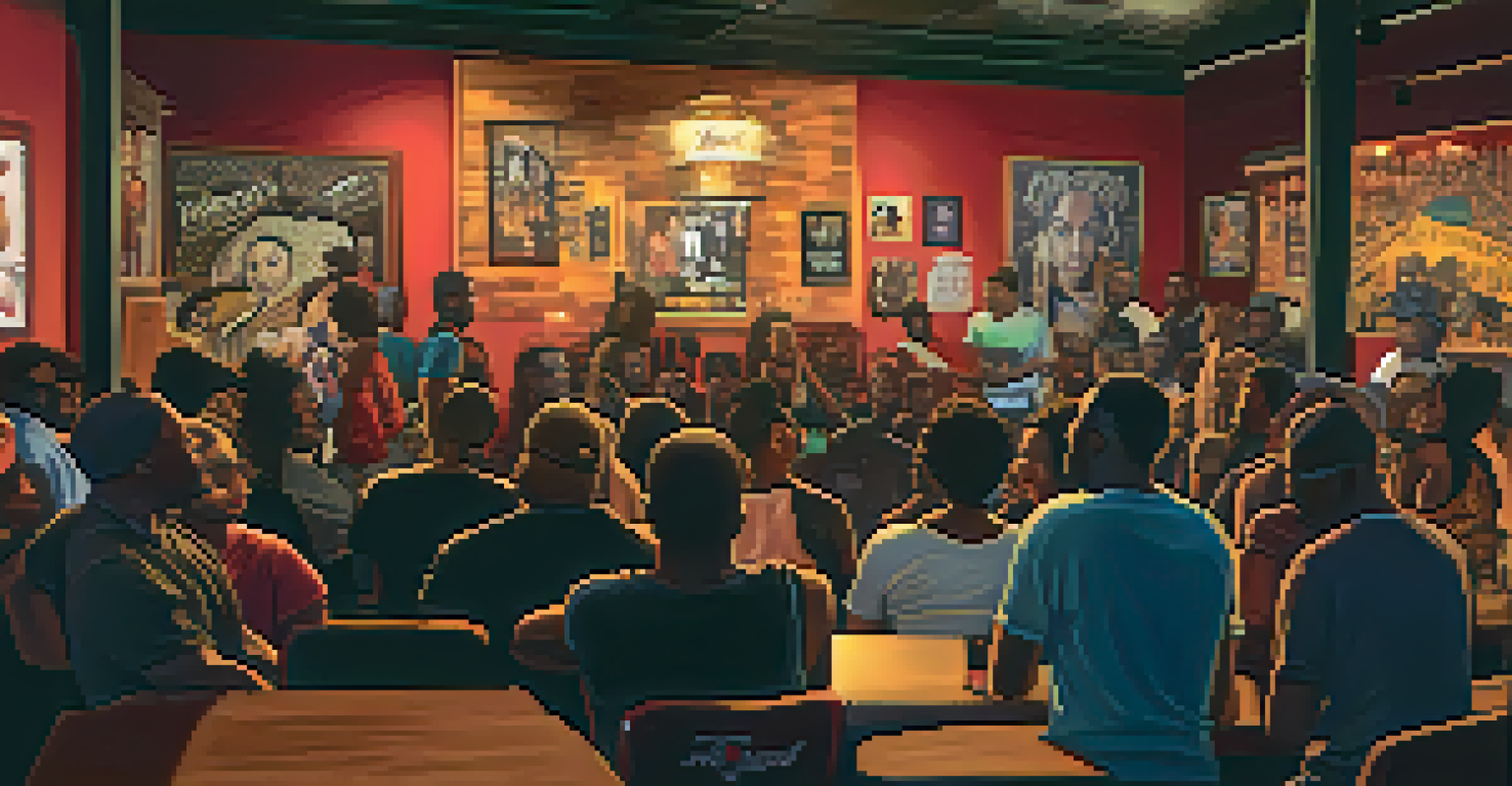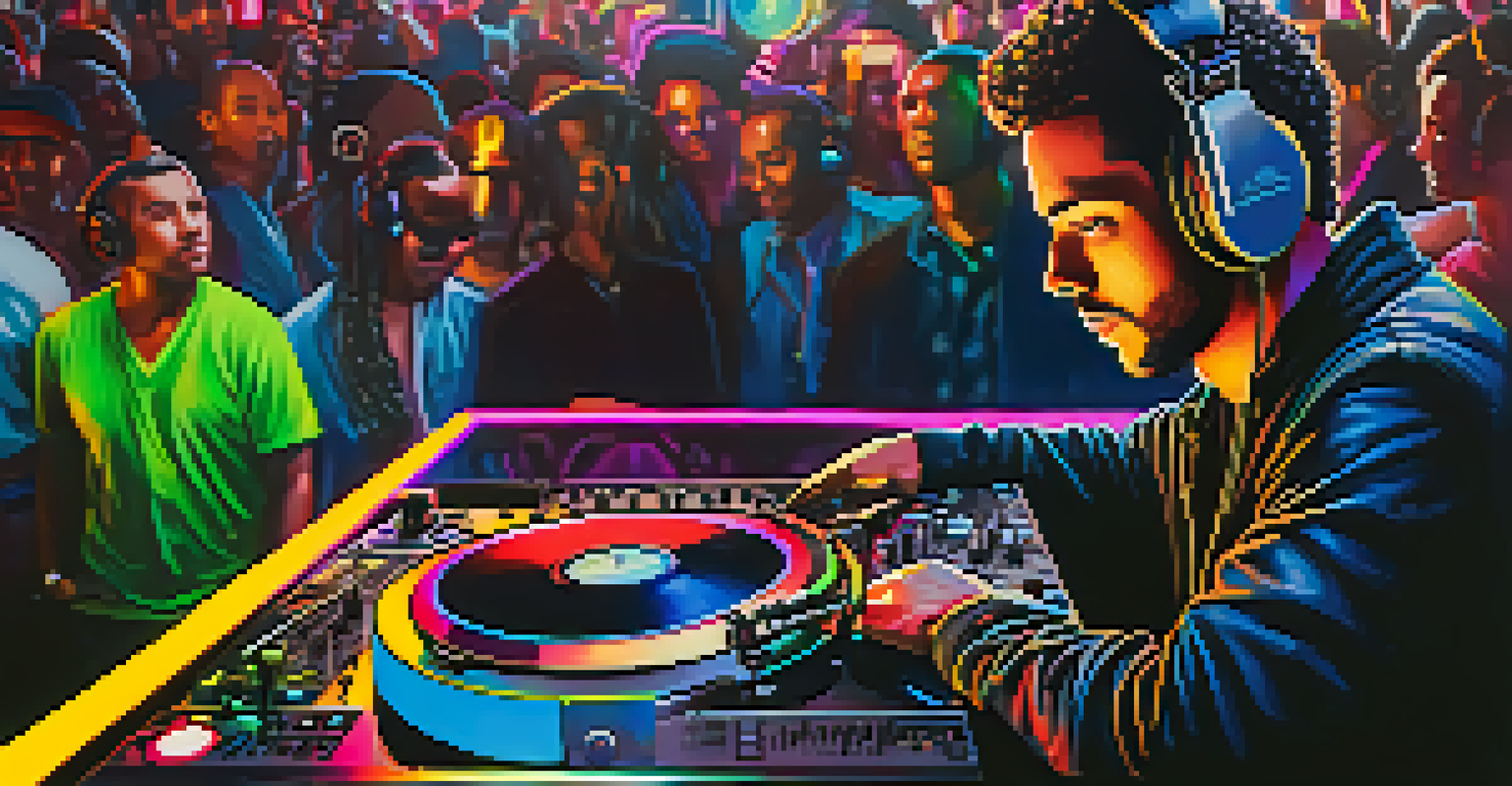The Role of Atlanta's Clubs in Hip-Hop Music's Rise

The Birthplace of Southern Hip-Hop Culture
Atlanta has long been recognized as a pivotal player in the hip-hop scene, especially in the Southern genre. The city's clubs provided a platform for local talent to showcase their skills, from freestyle battles to full-blown performances. Venues like The Masquerade and Club Kaya became incubators for emerging artists, allowing them to connect with fans and industry insiders alike.
Atlanta is the epicenter of hip-hop culture, where the clubs are the lifeblood of the scene.
In the late 1990s, Atlanta's hip-hop culture began to flourish, driven by clubs that embraced the unique sounds of the South. Artists such as OutKast and Goodie Mob gained traction in these spaces, blending storytelling with Southern flair. This laid the groundwork for future generations, making Atlanta a cultural touchstone for hip-hop enthusiasts.
The club scene also encouraged collaboration, creating a melting pot of diverse sounds and styles. This rich tapestry of influences helped shape what we now recognize as the Southern hip-hop sound, which continues to dominate the charts today.
Clubs as Launch Pads for New Talent
Clubs in Atlanta have always served as launch pads for aspiring artists looking to break into the hip-hop industry. Many well-known artists, such as Ludacris and Future, honed their craft on these stages before achieving fame. This atmosphere of experimentation and creativity encouraged artists to push their boundaries and explore new styles.

Open mic nights and local showcases became vital opportunities for artists to gain exposure and connect with peers. These events often attracted record label scouts and producers, creating a direct link between the underground scene and the commercial world. As a result, clubs played a crucial role in the career trajectories of countless hip-hop stars.
Atlanta Clubs Foster Hip-Hop Talent
Clubs in Atlanta serve as vital launch pads for aspiring hip-hop artists, providing them with opportunities to showcase their skills and connect with industry insiders.
Moreover, the success stories emerging from Atlanta's clubs inspired a wave of new talent. Young artists flocked to the city, eager to follow in the footsteps of those who had paved the way, further enriching the local hip-hop landscape.
The Influence of Club DJs on Hip-Hop Trends
DJs at Atlanta's clubs have significantly shaped the sounds and trends within the hip-hop genre. They are not just entertainers; they are trendsetters, often responsible for breaking new tracks and introducing audiences to the latest artists. The energy they create on the dance floor translates into the music that resonates with fans outside the club.
The clubs in Atlanta have been a launching pad for so many artists, shaping the sound of hip-hop for years to come.
For instance, the iconic DJ Holiday became known for his ability to elevate tracks from local artists, helping them gain national recognition. His sets often featured exclusive remixes and collaborations, making him a key player in the success of several Atlanta-based artists. This symbiotic relationship between DJs and artists solidified the clubs as essential venues for hip-hop innovation.
Additionally, the rise of social media has amplified the impact of club DJs, allowing them to reach wider audiences. Live streams and viral clips from club performances have made it easier for artists to gain traction, showcasing how the traditional club culture continues to evolve.
The Role of Dance in Hip-Hop Clubs
Dance has always been an integral part of hip-hop culture, and Atlanta's clubs are no exception. The vibrant dance scene in the city, highlighted by styles like crunk and twerking, has directly influenced the music played in these venues. This connection between rhythm and movement creates an immersive experience for club-goers.
Clubs often feature dance-offs and competitions, encouraging attendees to showcase their skills. This not only fosters a sense of community but also serves as a testing ground for new dance moves that may eventually go viral. The synergy between music and dance in these clubs has paved the way for choreographed routines seen in music videos today.
DJs Shape Hip-Hop Trends in Clubs
DJs at Atlanta's clubs play a crucial role in introducing new tracks and artists, significantly influencing the evolving sounds and trends within the hip-hop genre.
Moreover, the incorporation of dance into hip-hop events has elevated the overall experience for fans. It transforms a simple night out into a cultural celebration, where attendees can participate in the art form that is hip-hop.
Networking and Community Building in Clubs
Beyond the music and dance, Atlanta's clubs have become vital hubs for networking within the hip-hop community. Artists, producers, and fans mingle, fostering relationships that can lead to collaborations and opportunities. This sense of camaraderie is essential for the growth of the local scene.
Many successful artists credit their club experiences for the connections they made that helped them climb the industry ladder. Whether it was meeting a producer or collaborating with a fellow artist, these environments create spaces for creativity to flourish. The informal nature of club interactions often leads to genuine connections.
Additionally, clubs have served as safe spaces for artists to express themselves and share their stories. This communal atmosphere helps to build a supportive network, ensuring that the vibrant hip-hop culture in Atlanta continues to thrive.
The Impact of Atlanta's Clubs on National Hip-Hop Culture
The influence of Atlanta's clubs extends far beyond the city limits, impacting the national hip-hop culture. As artists from Atlanta gain recognition, their music and style become interwoven with the broader hip-hop narrative. This has led to a new wave of Southern hip-hop that challenges traditional concepts of the genre.
Artists like Migos and Lil Baby, who emerged from the Atlanta club scene, have helped redefine what hip-hop can sound like. Their success has inspired a new generation of artists across the country to embrace their regional styles and sounds. This shift has made the genre more inclusive and diverse.
Atlanta's Clubs Impact National Scene
The vibrant club culture in Atlanta not only nurtures local artists but also shapes national hip-hop trends, making the city a key player in the genre's evolution.
Moreover, the trends and styles birthed in Atlanta's clubs often find their way into mainstream media, from music videos to fashion. This symbiotic relationship between local clubs and national culture highlights the city's role as a trendsetter within the hip-hop community.
Challenges Faced by Atlanta's Club Scene
Despite its vibrant culture, Atlanta's club scene faces challenges that threaten its future. Issues such as gentrification and rising costs have led to the closure of several iconic venues, disrupting the ecosystem that supports local artists. This has sparked concerns about the sustainability of Atlanta as a hip-hop hub.
Additionally, the COVID-19 pandemic significantly impacted clubs and live music venues across the nation. Many artists lost their primary platforms for showcasing their work, leading to a temporary halt in the thriving scene. As clubs begin to reopen, the focus is on rebuilding and re-establishing connections within the community.

The resilience of Atlanta's artists and club owners is crucial in navigating these challenges. By rallying together and supporting one another, they can ensure that the city's rich hip-hop legacy continues to thrive for generations to come.